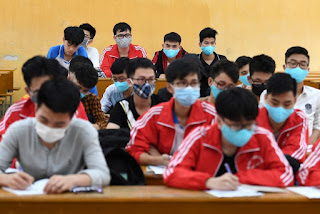Children in China’s two most important cities went back to school Monday after more than three months at home, as coronavirus restrictions eased and governments around the world began charting a path out of the pandemic lockdown.
Europe’s four worst-affected countries all reported marked drops in their daily death tolls, offering hope that the outbreak may have peaked in some places — at least for now.
But leaders and experts remain divided on how quickly to revive shuttered economies while maintaining a delicate balance between freedom and safety.
Italy and New York laid out partial reopening plans, with France and Spain to follow suit this week, while tens of thousands of final-year students returned to school in Shanghai and Beijing after months of closures.
“I’m glad, it’s been too long since I’ve seen my classmates,” 18-year-old Hang Huan said in Shanghai. “I’ve missed them a lot.”
Students in Beijing must have their temperatures checked at school gates and show “green” health codes on an app that calculates a person’s infection risk, according to the education ministry.
Norway, which says it has the new coronavirus epidemic under control, reopened primary schools to the youngest students on Monday, in another step toward a gradual normalisation, though some parents expressed concern.
One week after nursery schools, pupils aged six to 10 started returning to their school desks after six weeks of remote learning from home in the Nordic country.
Classes were however reduced to a maximum of 15 students.
Norway has progressively begun lifting restrictions imposed on March 12 to combat the spread of the novel coronavirus.
Hair salons and dermatologists were also authorised to resume business.
Many measures remain in place, such as bans on sporting and cultural events, as well as social distancing and hygiene recommendations.
“We should not let down our guard, we have to work hard to keep the spread under control,” Prime Minister Erna Solberg said on Friday.
“If we’re not careful, this could have serious consequences for others. In the worst of cases, we’ll have to tighten restrictions again. We’ll have to make sure to avoid that.”
AFP


















